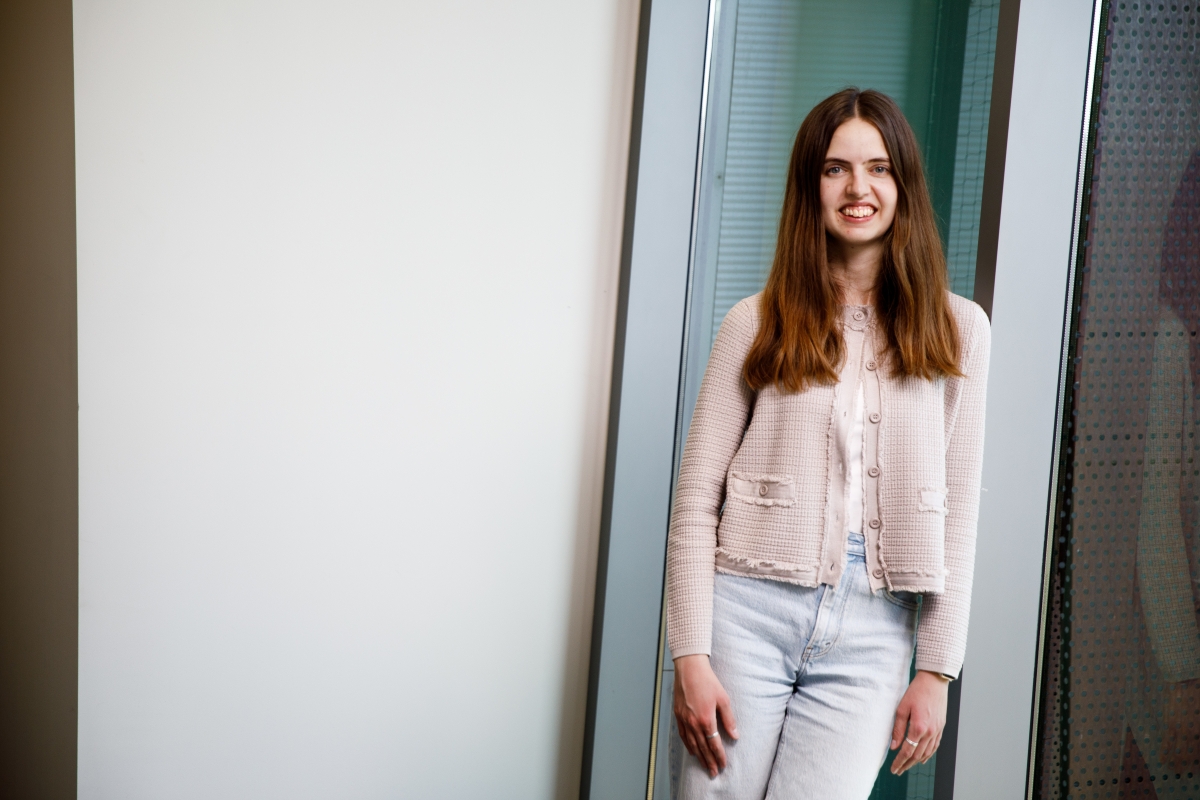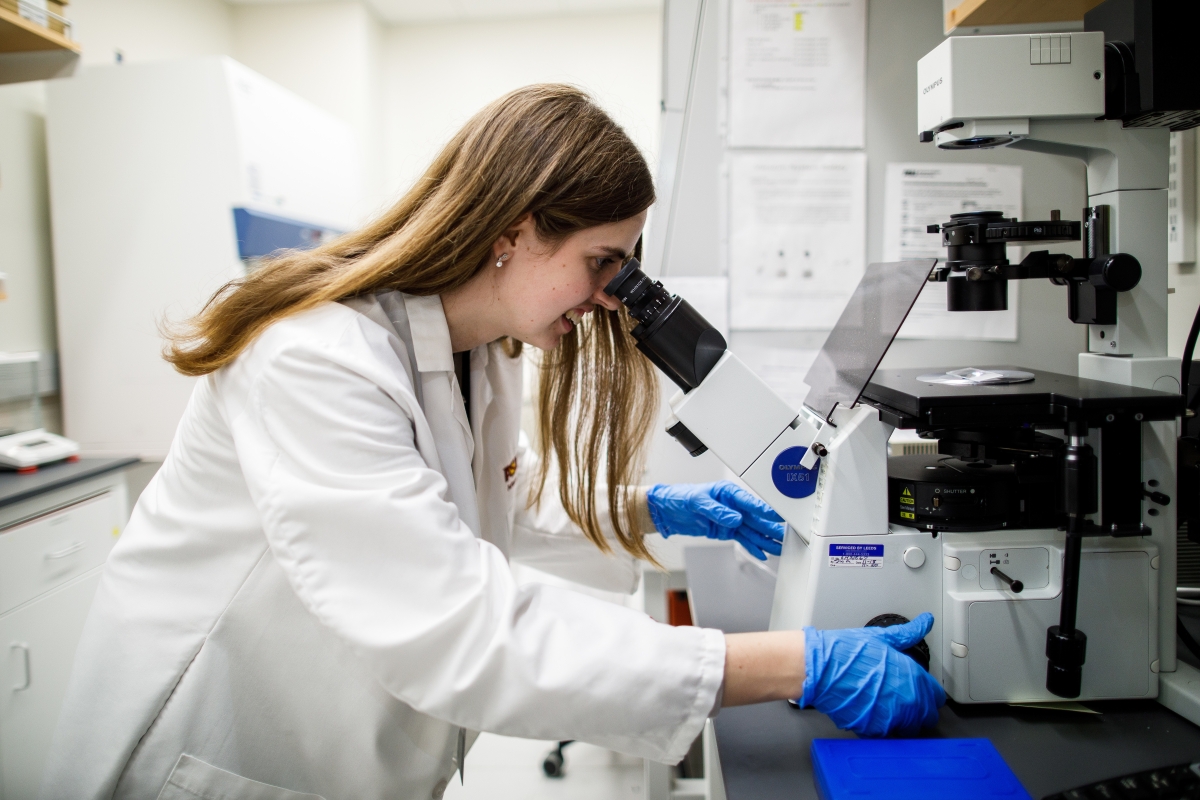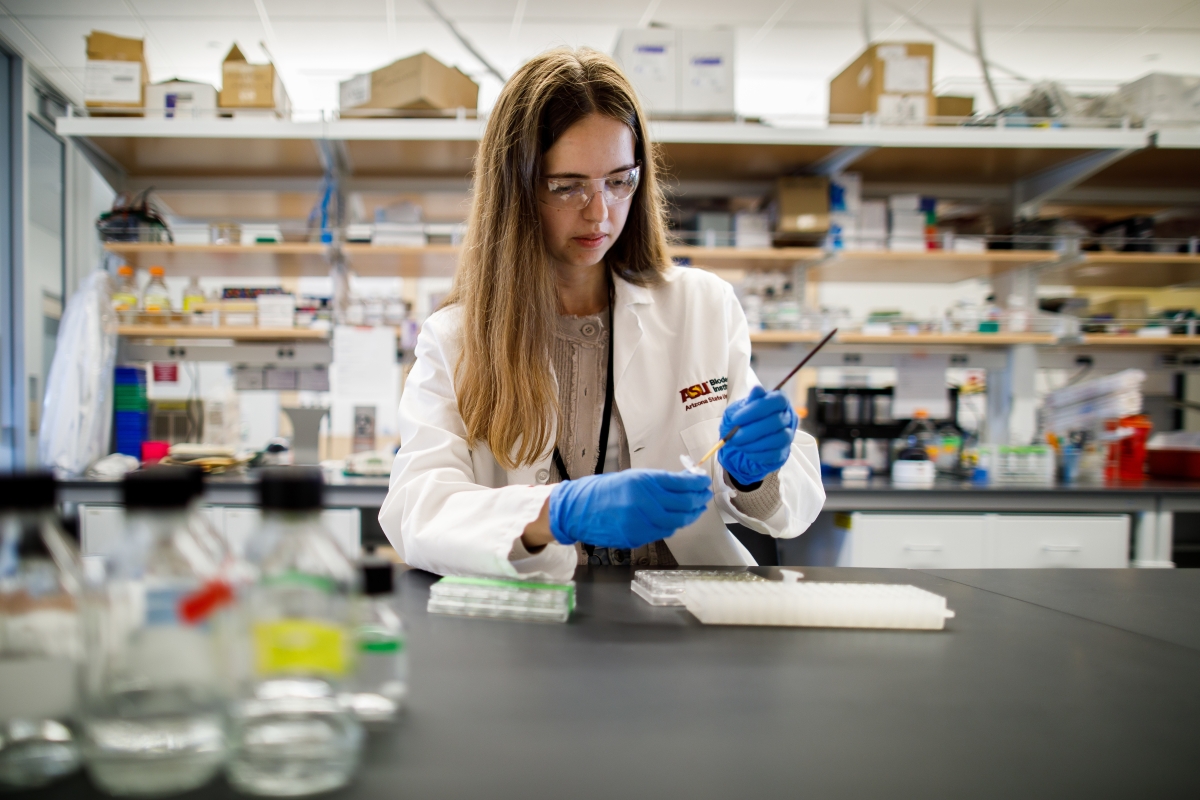ASU grad realizes full potential with support from mentor

Ulia Lopatin (right) works an in ASU lab.
Editor’s note: This story is part of a series of profiles of notable spring 2024 graduates.
Navigating passions in life and connecting that to education can be daunting for students, but with help from faculty and much perseverance, Ulia Lopatin found her footing.
Evidenced by her graduation this spring with dual bachelor’s degrees in biological sciences and neuroscience from The College of Liberal Arts and Sciences, Lopatin has had a full plate during her time at ASU.
Though she's had to balance her extracurricular activities, her academic pursuits as a student in Barrett, The Honors College and her responsibilities in Diego Mastroeni’s lab in the ASU-Banner Neurodegenerative Disease Research Center at the Biodesign Institute, Lopatin says she has drawn strength from the challenge — and found a mentor along the way.
She credits Mastroeni as the “most important influence on my academic and professional development.”
“As my thesis director and research mentor, he nurtured my intellectual curiosity and instilled a deep appreciation for the scientific process,” Lopatin said. “Mastroeni’s emphasis on maintaining both a strong work ethic and work-life balance helped shape me into an independent, well-rounded researcher.”
Mentorship has played a pivotal role in Lopatin’s academic journey and has helped her gain the confidence to pursue her passion for science. Lopatin added “when self-doubt clouded my decision to pursue a PhD, his resolute belief in me and my ability to conduct research helped me overcome my imposter syndrome.”
Following graduation, Ulia will move back to California to pursue a PhD in biomedical sciences at the University of California, Irvine. With a drive to solve problems, Lopatin’s goal in graduate school is to “investigate mechanisms of cancer immunotherapy resistance and contribute to the development and testing of novel therapy approaches to make a positive impact on cancer patient’s lives.”
Read more about Lopatin’s experience at ASU.
Question: What was your “aha” moment when you realized you wanted to study the field you majored in?
Answer: I entered ASU with a deep interest in biology but no clear direction on what I wanted to achieve within the field. However, as a freshman, I enrolled in BIO 302 Cancer: Mother of All Diseases per my academic advisor’s recommendation. Through this course, taught by Dr. Carolyn Compton, I became fascinated by the mechanisms that diseases use to subvert the immune system and realized I wanted to work on problems that directly impact patients. My decision to add a second major in neuroscience was motivated by my desire to better understand the science behind my work on neurodegenerative diseases in Diego Mastroeni’s lab.
Q: Why did you choose ASU?
A: I was impressed by the large variety of learning and professional development opportunities at ASU and how accessible they were to students. As a visiting prospective student, it was clear to me that the students felt supported and encouraged to pursue their diverse interests. Additionally, I was drawn to Barrett, The Honors College, for the unique opportunity to experience a small liberal arts college within a large Research I university.
Q: How did you end up working on a team that is part of the Biodesign Institute?
A: After taking the class on cancer, I became interested in researching diseases and joined several clubs centered around research. I also attended several undergraduate research symposiums where I was exposed to the different labs on campus. Through this, I learned how to go about cold emailing professors and reached out to Diego Mastroeni at the Biodesign Institute. After the interview, I joined the lab and have been there ever since!
Q: How did the time you spent in your role as part of the Biodesign research community prepare you for your career?
A: I’ve worked on several challenges within neurodegenerative diseases over the past three years. One project focused on a potential therapeutic target for the prevention of neurofibrillary tangles in Alzheimer’s disease. Recently, I successfully defended my honors thesis project, which supports an ongoing effort to understand how microglia modulate neuroinflammation in Parkinson’s disease. Through these experiences, I developed critical thinking skills, independence and resilience, which has prepared me to pursue a PhD and overcome any challenges I encounter in the future.
Q: What’s the best piece of advice you’d give to those still in school?
A: Rejection hurts, but don’t stop putting yourself out there! Throughout my time at ASU, I’ve been rejected far more times than I can count — from running for a student government position to applying for internships and scholarships to even auditioning for solos within my acapella group. Understandably, it isn’t a great feeling to try your best and come up short. The key is to learn as much as you can from the experience and to not let it stop you from achieving your next success.
Q: What was your favorite spot on campus, whether for studying, meeting friends or just thinking about life?
A: The second floor balcony of the Student Pavilion is one of my favorite places on campus. There is something special about the combination of seeing students walking below, hearing the ASU bells chime and enjoying the fresh air that is conducive to working through any problems, whether academic or in life.
Q: If someone gave you $40 million to solve one problem on our planet, what would you tackle?
A: I would focus on increasing access to education and tackling the many cultural and socioeconomic barriers preventing children worldwide from attending school. Everyone deserves to have an opportunity to learn, yet so many children are unable to receive a basic education.
More Sun Devil community

Barrett program unlocks study abroad for first-year honors students
Twenty first-year students from Barrett, The Honors College at Arizona State University are spending their second semester studying abroad in Rome, Italy.Traveling in a tight-knit honors community…

A champion's gift: Donation from former Sun Devil helps renovate softball stadium
Jackie Vasquez-Lapan can hear the words today as clearly as she did 17 years ago.In 2008, Vasquez-Lapan was an outfielder on Arizona State University’s national championship-winning softball team,…

Student-led business organization celebrates community, Indigenous heritage
ASU has seen significant growth in Native American student enrollment in recent years. And yet, Native American students make up less than 2% of the student population.A member of the Navajo Nation,…




